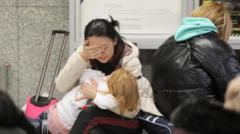As tensions rise in Poland ahead of critical elections, Ukrainian refugees report a dramatic increase in xenophobia and bullying, sparking fears of growing anti-Ukrainian sentiment.
Rising Anti-Ukrainian Sentiment in Poland Causes Alarm Among Refugees

Rising Anti-Ukrainian Sentiment in Poland Causes Alarm Among Refugees
Reports reveal an unsettling increase in anti-Ukrainian attitudes among Poles, with refugees voicing their experiences of harassment and discrimination.
The images of Polish citizens opening their homes to Ukrainians fleeing war seem a distant memory for some, as the surge of anti-Ukrainian sentiment grows in various facets of Polish society. Svitlana, a Ukrainian mother, poignantly illustrates this shift: her daughter, who once thrived in her new school, now faces bullying and xenophobic taunts. "Go back to Ukraine," a fellow student told her daughter, while others mockingly mimicked missile attacks—an unkind reminder of the violence that uprooted their lives.
Reports indicate that Svitlana's experience is not isolated. Many Ukrainians in Poland have shared troubling incidents of public harassment, discriminatory behavior in schools, and negative portrayals online. These sentiments appear to have coincided with Poland's political landscape, which has grown increasingly divisive as presidential elections approach, set to take place this coming Sunday.
While 2.5 million Ukrainians constitute nearly 7% of Polish society, the once-sympathetic environment has begun to waver. Ukrainian activist Natalia Panchenko notes that, initially, Poles collectively opened their hearts and homes—they provided aid, shelter, and support for those in desperate need—but this camaraderie appears to be eroding.
Recent polls by the CBOS Centre reflect a stark decline in favorable attitudes toward Ukrainian refugees; support dropped from 81% to 50% within two years. Activists attribute this shift to increasing anti-Ukrainian rhetoric amongst political candidates, with figures such as far-right populist Slawomir Mentzen espousing openly anti-Ukrainian views.
Even front-runner Rafal Trzaskowski seems hesitant to fully endorse pro-Ukrainian policies, instead adopting a more centrist strategy to sway voters. This adjustment comes as evidence mounts of Russian disinformation campaigns seeking to exploit and deepen divisions within Polish society. Reports indicate that narratives portraying Ukrainians as a drain on resources and a threat to cultural stability are proliferating on social media.
As the elections draw near, the intersection of politics, public sentiment, and ongoing war in Ukraine compels many Ukrainians in Poland, like Svitlana, to reassess their future in a country that once welcomed them with open arms but now harbors unfounded fears and prejudices. The fear of reprisals and growing xenophobia pose urgent questions about coexistence in Poland, where Ukrainian refugees continue to seek safety and belonging amidst a changing social landscape.
Reports indicate that Svitlana's experience is not isolated. Many Ukrainians in Poland have shared troubling incidents of public harassment, discriminatory behavior in schools, and negative portrayals online. These sentiments appear to have coincided with Poland's political landscape, which has grown increasingly divisive as presidential elections approach, set to take place this coming Sunday.
While 2.5 million Ukrainians constitute nearly 7% of Polish society, the once-sympathetic environment has begun to waver. Ukrainian activist Natalia Panchenko notes that, initially, Poles collectively opened their hearts and homes—they provided aid, shelter, and support for those in desperate need—but this camaraderie appears to be eroding.
Recent polls by the CBOS Centre reflect a stark decline in favorable attitudes toward Ukrainian refugees; support dropped from 81% to 50% within two years. Activists attribute this shift to increasing anti-Ukrainian rhetoric amongst political candidates, with figures such as far-right populist Slawomir Mentzen espousing openly anti-Ukrainian views.
Even front-runner Rafal Trzaskowski seems hesitant to fully endorse pro-Ukrainian policies, instead adopting a more centrist strategy to sway voters. This adjustment comes as evidence mounts of Russian disinformation campaigns seeking to exploit and deepen divisions within Polish society. Reports indicate that narratives portraying Ukrainians as a drain on resources and a threat to cultural stability are proliferating on social media.
As the elections draw near, the intersection of politics, public sentiment, and ongoing war in Ukraine compels many Ukrainians in Poland, like Svitlana, to reassess their future in a country that once welcomed them with open arms but now harbors unfounded fears and prejudices. The fear of reprisals and growing xenophobia pose urgent questions about coexistence in Poland, where Ukrainian refugees continue to seek safety and belonging amidst a changing social landscape.





















